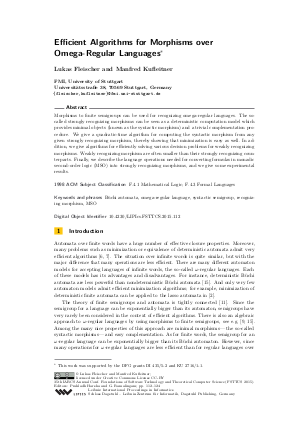Efficient Algorithms for Morphisms over Omega-Regular Languages
Authors Lukas Fleischer, Manfred Kufleitner
-
Part of:
Volume:
35th IARCS Annual Conference on Foundations of Software Technology and Theoretical Computer Science (FSTTCS 2015)
Part of: Series: Leibniz International Proceedings in Informatics (LIPIcs)
Part of: Conference: IARCS Annual Conference on Foundations of Software Technology and Theoretical Computer Science (FSTTCS) - License:
 Creative Commons Attribution 3.0 Unported license
Creative Commons Attribution 3.0 Unported license
- Publication Date: 2015-12-14
File

PDF
LIPIcs.FSTTCS.2015.112.pdf
- Filesize: 436 kB
- 13 pages
Document Identifiers
Subject Classification
Keywords
- Büchi automata
- omega-regular language
- syntactic semigroup
- recognizing morphism
- MSO
Metrics
- Access Statistics
-
Total Accesses (updated on a weekly basis)
0Document
0Metadata
Abstract
Morphisms to finite semigroups can be used for recognizing omega-regular languages. The so-called strongly recognizing morphisms can be seen as a deterministic computation model which provides minimal objects (known as the syntactic morphism) and a trivial complementation procedure. We give a quadratic-time algorithm for computing the syntactic morphism from any given strongly recognizing morphism, thereby showing that minimization is easy as well. In addition, we give algorithms for efficiently solving various decision problems for weakly recognizing morphisms. Weakly recognizing morphism are often smaller than their strongly recognizing counterparts. Finally, we describe the language operations needed for converting formulas in monadic second-order logic (MSO) into strongly recognizing morphisms, and we give some experimental results.
Cite As Get BibTex
Lukas Fleischer and Manfred Kufleitner. Efficient Algorithms for Morphisms over Omega-Regular Languages. In 35th IARCS Annual Conference on Foundations of Software Technology and Theoretical Computer Science (FSTTCS 2015). Leibniz International Proceedings in Informatics (LIPIcs), Volume 45, pp. 112-124, Schloss Dagstuhl – Leibniz-Zentrum für Informatik (2015)
https://doi.org/10.4230/LIPIcs.FSTTCS.2015.112
BibTex
@InProceedings{fleischer_et_al:LIPIcs.FSTTCS.2015.112,
author = {Fleischer, Lukas and Kufleitner, Manfred},
title = {{Efficient Algorithms for Morphisms over Omega-Regular Languages}},
booktitle = {35th IARCS Annual Conference on Foundations of Software Technology and Theoretical Computer Science (FSTTCS 2015)},
pages = {112--124},
series = {Leibniz International Proceedings in Informatics (LIPIcs)},
ISBN = {978-3-939897-97-2},
ISSN = {1868-8969},
year = {2015},
volume = {45},
editor = {Harsha, Prahladh and Ramalingam, G.},
publisher = {Schloss Dagstuhl -- Leibniz-Zentrum f{\"u}r Informatik},
address = {Dagstuhl, Germany},
URL = {https://drops.dagstuhl.de/entities/document/10.4230/LIPIcs.FSTTCS.2015.112},
URN = {urn:nbn:de:0030-drops-56200},
doi = {10.4230/LIPIcs.FSTTCS.2015.112},
annote = {Keywords: B\"{u}chi automata, omega-regular language, syntactic semigroup, recognizing morphism, MSO}
}
